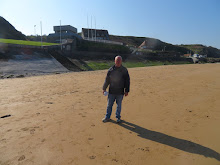As I went by the Mall's World War II Memorial alongside L on my last training run as a coach for my club, I told L that carved into the wall over by the Atlantic column were two battles that the father of a close friend had fought at, the Bulge and the Rhineland. This old Patton warrior had passed on mere weeks ago, another American hero gone away. L, being a Navy veteran, was non-responsive in talk about a soldier.
Then I said that carved into the wall over by the Pacific column were two battles that my father had fought at, Peleliu and Okinawa. L suddenly became animated.
"Really?" he said, with respect in his voice. "My father was a Marine also, and was at Guam and elsewhere and fought at Iwo Jima."
"Really?" I said with respect in my voice. "Me and my brother, who was a combat Marine in Beirut when they blew up the barracks, had an argument once. I said Peleliu was the worst combat in World War II, perhaps in history, since the First Division had to dig entrenched Japanese soldiers out of fortified caves blasted into mutually-supporting steep coral ridges in 112 degree heat with no cover. But he said that Iwo was even tougher, and I had to admit that it probably was."
L is black. In World War II black Marines, who received the same training as white Marines, were kept in segregated outfits and used as supply service troops given the dangerous task of unloading ordnance and other supplies on the beaches while their white brethren fought on the front lines a few miles away. Such was the racism of America in the forties.
At a few desperate, terrible battles in the Pacific, including Peleliu and Iwo Jima, these black troops were called up into the front lines as combat replacements because the fighting was so horrific that there were no other troops available to restore the decimated units to a semblance of combat effectiveness. These Americans, who were fighting two enemies at once, the common enemy and society's prejudice, proved themselves to be worthy of the hero's mantle that cloaked all combat Marines in the Pacific.
L told me that his father is 93, well and living nearby in Maryland. He sees him daily. I asked L to pass my respects on to his father, and tell him that there are young men in our society who read books and know the terrific sacrifices that he and his friends went through. I lied about the young man part. L said that he would pass on my sentiments to his father, who would appreciate hearing them.
With our conversation finally charged, as we ran by the Pentagon near the end of our sojourn, L told me where he was on 9/11/01. He worked in the Pentagon then and lost friends there, but that morning he was on a detail at Bolling Air Force Base. He was out for a run when suddenly security at the base came alive and emergency vehicles started going everywhere. He went into the post and found out we were under attack. He said he wished then that he was at sea in a battle group, because they all would have gone to battle stations instantly and been ready to defend themselves within moments. On the base, however, there was no defense, only chaos. They could only stand by and wait to see what would materialize. It was awful, he said, we were totally unprepared for what hit us that day.
Our interesting conversation at an end, we ran up to our end point, Gotta Run, and the end of both the run and my coaching career. We had gone 8.6 miles in 1:21:59, a 9:32 pace. Mark my word, L is gonna rock his hoped-for 9:30s tomorrow at Army.
Subscribe to:
Post Comments (Atom)

No comments:
Post a Comment